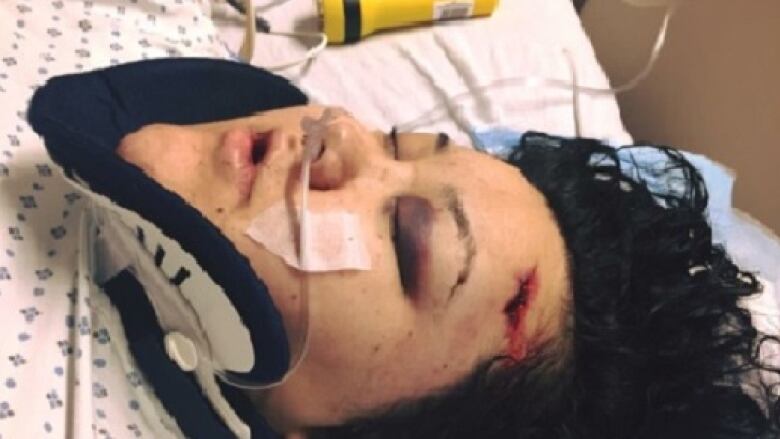Assaults on youth workers in Manitoba a 'daily occurrence'

Attacks on staff working with high-needs youth in Manitoba are more common than people realize, says the head of an association representingworkers.
"Unfortunately, the reality is that this high-risk work environment is one that hundreds of childandyouth care practitioners experience every day in this province," Jessica Hadley,president of Child and Youth Care Workers' Association of Manitoba, stated in a letter sent to CBC News.

On Sunday, two women one of them was awork placement studentwere attacked while working at theSelkirk Behavioural Health Foundation.
They werebeatenwith a baseball bat, rods from a foosball tableand billiardballs stuffed inside socks, said one of the victims, student Jackie Healey, 23.
She suffereda cracked skull and broken teeth on the last day of her work placement program from Red River College. Her left eye is swollen shut and she's not sure she will regain her sight in it.
The other woman was treated and releasedfrom hospital, where shereceived about 24 staples in her head, according to her son, who said she played dead in order tosurvive the attack.
- Employee 'played dead' to survive attack at behavioural centre, son says
- Red River College hires external investigator after 'horrific incident' involving student
- Teens face 17 charges after Jackie Healey assaulted during work placement
- Student addictions worker recounts beating with bat and pool balls
A17-year-old and a 16-year-oldwere arrested on Tuesday in Winnipeg and face numerous charges.
The names of the accused can't be released due to the provisions of the Youth Criminal Justice Act.
ManitobaWorkplace Health and Safety is investigating the incident, as is Red River College.
System in 'crisis'
Finding a fix for situations that allowsuch violence to happen is not simple, Hadley said.
The agencies that employ the workers are understaffed and underfunded yet face an increased demand on their services from "an ever-growing population of youth with complex needs," she wrote in her letter.

"The staff that work with these youthare also often undereducated with minimal experience, and the government-relatedrequirements to work in this field are minimal."
Stress, risk of physical harmand low wages make for high levels of staff turnover "that alsocreates its own challenges for programs," Hadley added.
"Anyone who is part of our system, especially thosethat are providing the front-line service, can tell you that our system is beyond broken. It isactively in crisis."
Hopefullythe latest incident, which has thrust the system into the media spotlight, will prompt some improvements, she said.
"My heart is breaking for the two women involved and all of that, but I think that the reality is, is what this incident, what this tragedy has done, is allowed us to actually start to talk," Hadley said in an interview with CBC News.
For example, it's not uncommon in a group home setting tohave two workers supervising sixchildren. If one of those kids has a doctorappointment, then one worker is left to supervise five high-needs youth, she said.
"Historically, in Manitoba,we have a habit of reacting and not responding when parts of our Child and Family Servicesystem hits the news. Perhaps this time, we can stop and look at what we can do differentlyand make real change within this province,"Hadley wrote in her letter.
"There are things that can be addressed that wouldcreate real solutions. We need to look at staff training and their qualifications. We need tolook at how we provide support for the people who are front line with high needs youthevery day and how we keep them safe. We need to address the staffing ratios that arecurrently in place and increase them.
"We need to address funding models that do not allowfor any of these things to occur."
Similarly, the youth who are being treated in facilities like the one where the attacks happened on Sundaydeserve educated, qualifiedand well-trained staff "to helpthem on their way," Hadley said.
JessicaHadley'sopen letter on child and youth care practice in Manitoba
On Sunday, May 29, 2016, two Child and Youth Care Practitioners were attacked and beatenby two youth in theircare. One was a student finishing her practicum and one was a BHFemployee. They were working with high needs youth that were struggling with addictions.
They were there to help and provide guidance and support. They were there to do their jobs.They were victims of a brutal attack that will leave permanent physical and emotional scars.There is no way of making any of it okay or right. Quite simply, it should not have happened.
Since the news of the attack, we have heard discussions about the agency. We have heard the family of one of the victims say that they were told it wasn't a safe place to work. Red River College has been asked how they let a student complete a practicum in that environment. The press are focusing on the aspects of this situation like its the exception and can simply be "fixed" by improved standards of safety at an Agency and in how practicums are utilized. It would be wonderful if that were the reality of all of this.
Unfortunately, the reality is that this high risk work environment is one that hundreds of Child and Youth Care Practitioners experience every day in this province. What happened on Sunday has happened to other people in this field where assaults and verbal abuse are a daily occurrence. It was not the exception to be minimally staffed while providing students with work experience. It is, sadly, common practice. It is not best practice, and we all know that, but it is the world within which the people in this field live and work. In fact, if you remove the student from Sunday's scenario, you have an employee that was working alone with high needs adolescent males.
It would be easy to blame the Agencies that employ us but they too are subject to a broken,over taxed system that asks them to provide quality care for our provinces highestneedsyouth. They are bound by inadequate funding, an increasing demand on services, and anever growing population of youth with complex needs. The Staff that work with these youthare also often under educated with minimal experience and the government relatedrequirements to work in this field are minimal. The high stress, risk of physical harm, vicarioustraumatization experienced, and often low wages make Staff turn over high and that alsocreates its own challenges for programs. Anyone who is part of our system, especially thosethat are providing the frontline service, can tell you that our system is beyond broken. It isactively in crisis.
There are no easy answers and no quick fixes when a crisis occurs. Historically, in Manitoba,we have a habit of reacting and not responding when parts of our Child and Family Servicesystem hits the news. Perhaps this time, we can stop and look at what we can do differentlyand make real change within this province. There are things that can be addressed that wouldcreate real solutions. We need to look at Staff training and their qualifications. We need tolook at how we provide support for the people who are frontline with high needs youtheveryday and how we keep them safe. We need to address the staffing ratios that arecurrently in place and increase them.We need to address funding models that do not allowfor any of these things to occur.
The other thing to remember as we are addressing these things is this. Manitoba has thehighest amount of children in care, well over 10,000, and that number is growing. They arethe children of this province and our responsibility. They are still there after the media tells thestory and the inquests are closed. They deserve educated, qualified, well trained Staff to helpthem on their way. They also deserve safe places to live and that is created by giving theirStaff safe places to work. The only way to do this is for us to hold ourselves and ourgovernment accountable and to find new and better ways to heal our system and create safeplaces for our greatest resource to develop.
JessicaHadley
President,Child and Youth Care Workers' Association of Manitoba












_(720p).jpg)


 OFFICIAL HD MUSIC VIDEO.jpg)
.jpg)



























































































